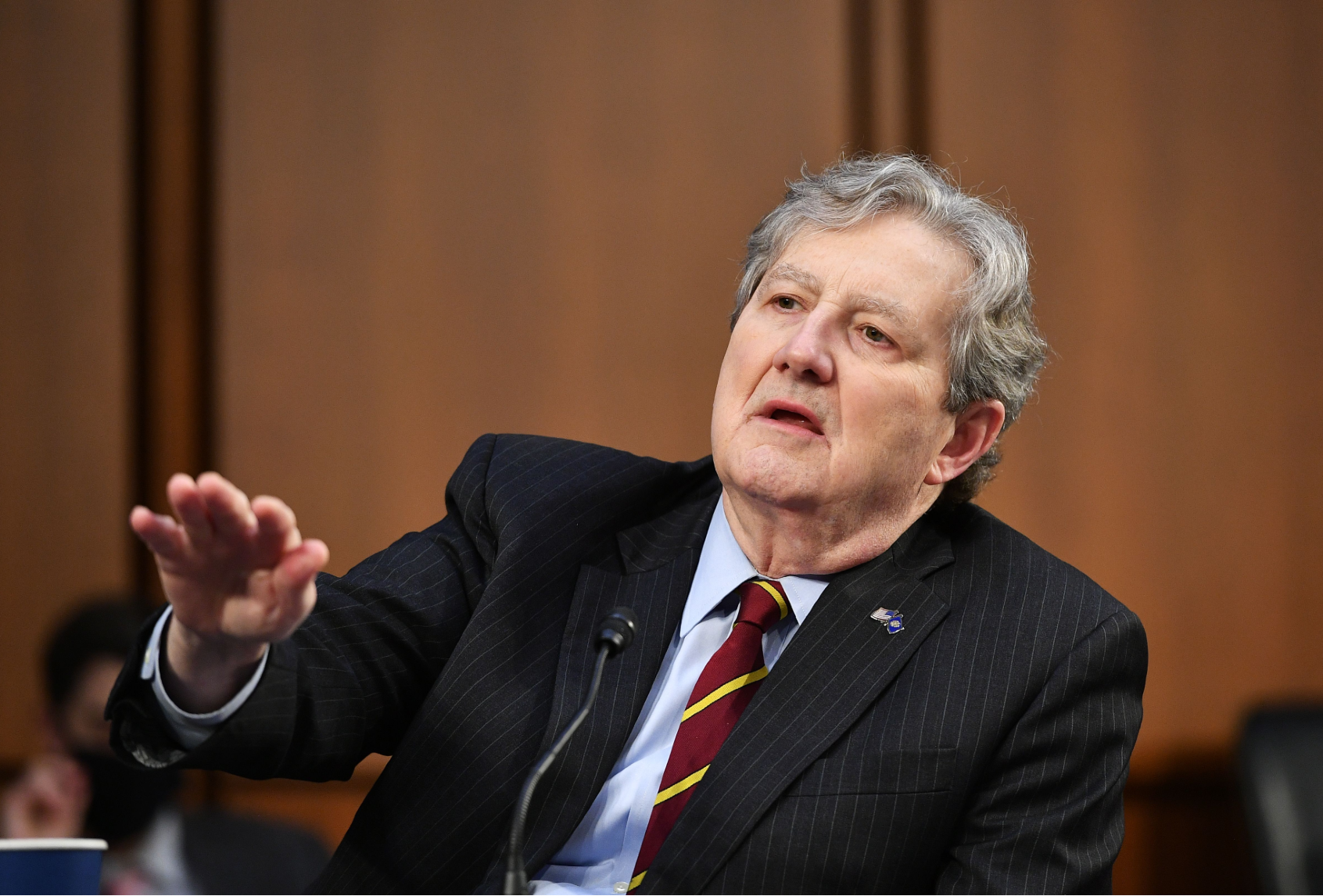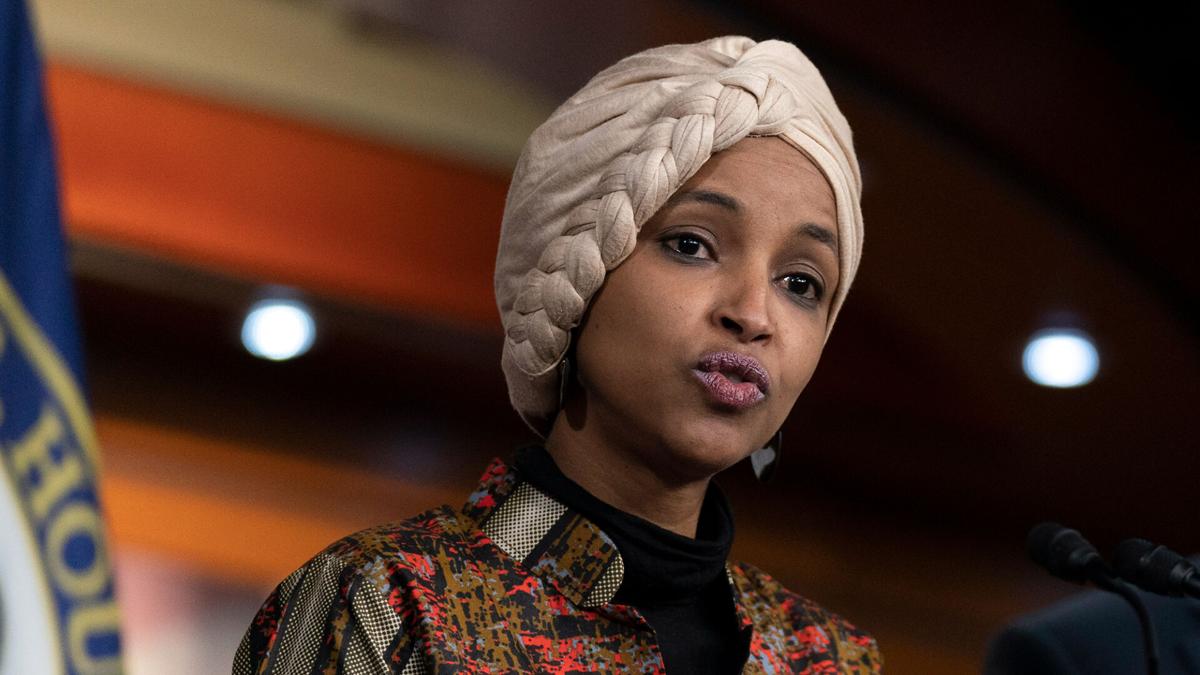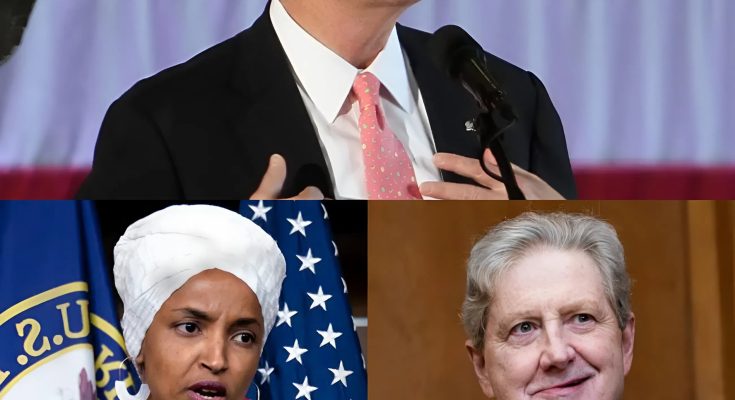In what was expected to be a routine congressional oversight hearing, Representative Ilhan Omar and Senator John Kennedy delivered a moment that instantly captured the nation’s attention, sparking debates, viral memes, and endless commentary across social media. The incident, brief yet explosive, unfolded when Omar appeared to target Kennedy with a pointed remark: “Sit down, kid!”—a phrase that instantly made headlines, not just for its audacity but for what it revealed about the underlying tensions shaping American politics today.
The exchange occurred during a hearing focused on federal budget allocations and government spending oversight, a topic that typically inspires detailed, if somewhat dry, discussion. Senator Kennedy, known for his folksy, blunt style and decades-long tenure in politics, was presenting his points on fiscal priorities when Omar’s remark cut through the session with surgical precision. While the comment lasted only seconds, the impact reverberated across the country. Eyewitnesses noted the sharp contrast in demeanor between the two lawmakers: Kennedy, calm and composed, versus Omar, who delivered her jab with a mix of authority and visible frustration.

Understanding the Remark: A Generational and Ideological Clash
At first glance, Omar’s comment may seem like a mere insult, but deeper analysis suggests it reflects broader generational and ideological tensions within Congress. Omar, one of the most prominent progressive voices of her generation, has often challenged traditional norms and long-standing political practices. Her political style emphasizes directness, urgency, and a willingness to confront established figures. Kennedy, in contrast, represents a more traditional, Southern-inflected political approach: measured, rhetorically precise, and often laced with humor.
This generational and stylistic clash was on full display in this hearing. Omar’s “Sit down, kid!” was not just a dismissal of Kennedy’s argument—it symbolically underscored a perceived disconnect between old-school politicians and the rising wave of progressive activism. Many commentators noted that the phrase implicitly framed Kennedy as out-of-touch, while simultaneously asserting Omar’s authority within the committee room.
Yet the phrase also sparked questions about decorum. Congressional hearings, while often heated, traditionally operate under rules of civility, and observers debated whether Omar crossed a line. Some political analysts argued her tone reflected frustration with slow-moving governmental processes, while others saw it as a calculated, performative jab designed to resonate with her political base.
Kennedy’s Response: A Masterclass in Poise
What followed, however, turned the spotlight entirely onto Kennedy. Instead of retaliating with sarcasm or anger—a common temptation in high-stakes political confrontations—he paused, assessed the moment, and delivered a response that experts have since described as both strategic and iconic. Kennedy’s approach was simple: acknowledge the comment without allowing it to derail the substantive conversation. In doing so, he demonstrated a level of composure that many political commentators argue is increasingly rare in today’s media-driven, hyper-partisan environment.
Kennedy’s measured response achieved multiple effects simultaneously. Firstly, it neutralized the immediate insult without escalating tension. Secondly, it reframed the discussion back to the issue at hand—government oversight and fiscal responsibility—emphasizing that personal jabs should not overshadow legislative priorities. Finally, it projected an image of authority and credibility that resonated not only with his colleagues but with millions of Americans watching the hearing unfold online.

Analysts described the moment as a “lesson in political optics,” highlighting how control over one’s response can transform a potentially humiliating encounter into a defining moment of leadership. In other words, Kennedy’s silence and measured articulation spoke louder than any retort could have, leaving both Omar and the viewing public momentarily stunned.
Social Media Explosion: Public Reactions and Cultural Impact
As clips of the exchange circulated, social media platforms erupted. Memes, hashtags, and video commentaries flooded Twitter, TikTok, and Instagram. Hashtags such as #SitDownKid and #KennedyPoise trended within hours, illustrating the nation’s fascination with this moment of political theater. Analysts note that viral moments like this reflect a broader shift in how Americans engage with politics: a blend of entertainment, outrage, and admiration that often overshadows substantive debate.
The reaction was deeply divided. Supporters of Omar praised her willingness to confront a long-serving senator they perceive as emblematic of entrenched political power. To them, the comment was a reminder that younger politicians can assert themselves forcefully in spaces historically dominated by senior lawmakers. Critics, however, viewed the remark as disrespectful and emblematic of a decline in civility and decorum in American politics. Kennedy’s measured response, in contrast, received praise across ideological lines, with commentators emphasizing the power of patience and strategic restraint in high-pressure settings.
Historical Context: Civility, Rhetoric, and the Modern Age
This incident is not without historical precedent. Congressional hearings have long been arenas for confrontation, from fiery exchanges in the 19th century to televised spectacles in modern times. Yet the difference in the digital era is immediacy: every word can be clipped, remixed, and broadcast to millions within minutes. The stakes for political communication are higher than ever, and the ability to respond effectively under scrutiny can define a politician’s public persona for years to come.
Kennedy’s response, in this context, is a textbook demonstration of leveraging composure for strategic advantage. By reframing the encounter, he not only avoided escalation but turned what could have been a viral embarrassment into a defining showcase of his credibility and experience. Observers have compared the moment to other iconic political exchanges, arguing that its resonance lies in the contrast between impulsive provocation and calculated restraint.
Implications for American Political Discourse
Beyond the immediate spectacle, the hearing raises important questions about the state of political discourse in America. What does it mean when a brief remark—less than five words—can dominate national conversation? How do generational differences, ideological polarization, and the pressures of social media shape the behavior of elected officials?
Experts suggest that the Omar-Kennedy moment is emblematic of a broader cultural tension: the clash between performative, fast-paced political expression and the slow, deliberative traditions of governance. Omar represents a generation willing to challenge norms aggressively, while Kennedy embodies a political style rooted in patience and rhetorical control. Their interaction highlights the challenges and opportunities of bridging these two worlds in a democracy where both spectacle and substance compete for attention.
Lessons for Politicians, Citizens, and Observers
For politicians, the incident underscores the importance of timing, tone, and audience awareness. A single phrase can ignite national conversation, and the response—whether impulsive or measured—can define reputations. Kennedy’s example illustrates how restraint, strategic framing, and focus on core issues can transform confrontation into leadership.
For citizens and observers, the episode serves as a reminder of the complexities behind viral moments. What seems like a simple insult often reflects deeper political, generational, and cultural dynamics. Engaging critically with these moments can reveal insights about American governance, media influence, and public perception.
The Takeaway: Words Matter, but Responses Define Legacies
Ultimately, the “Sit down, kid!” moment demonstrates a profound lesson in American politics: words may sting, but it is the response that resonates across time and space. Kennedy’s calm, composed rebuttal transformed a potential flashpoint into a defining moment of political poise. Omar’s audacious remark, meanwhile, ensured the encounter would not be forgotten, illustrating both the power of provocation and the limits of rhetorical daring in the face of measured authority.

As analysts continue to dissect the hearing, it is clear that this moment will influence not only public perceptions of Omar and Kennedy but also broader conversations about civility, generational dynamics, and strategic communication in American politics. In an era where every soundbite can define a career, the lessons of this brief exchange are both immediate and enduring: composure under pressure, the value of reframing conflict, and the enduring impact of a well-considered response.
For now, America watches, debates, and shares. The viral clip circulates endlessly, prompting reflection on what it means to lead, to speak, and to respond in a country where political theater is inseparable from legislative reality. And while Omar’s words will be remembered for their audacity, it is Kennedy’s response that leaves the nation stunned—a masterclass in patience, strategy, and the art of politics.




